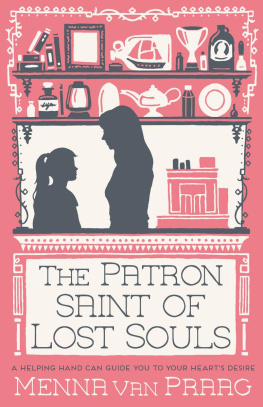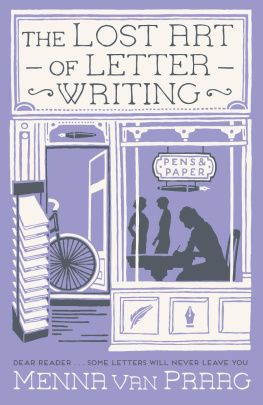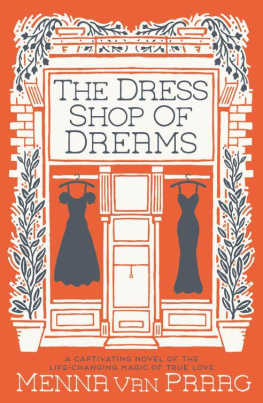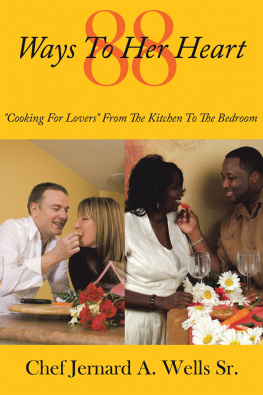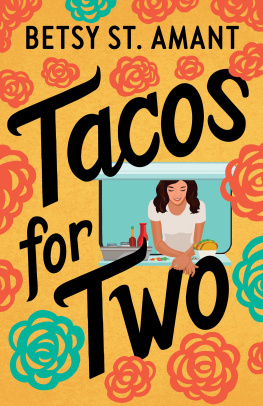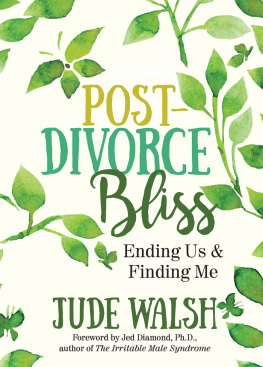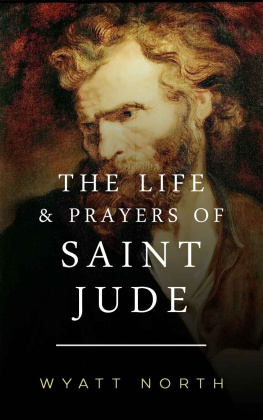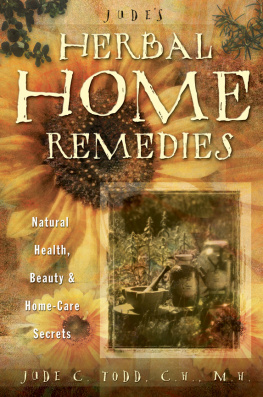Three phone calls would change Judes life. But that would come later. Now, Jude stands in her favourite spot, gazing out at snowflakes drifting down to sprinkle the street below. As she watches the early Christmas shoppers scuttling from shop to shop, their hats and hair brushed with a dusting of white, a twist of longing wraps slowly around Judes heart and squeezes tight.
Judes life is full of people. She sees dozens in the shop every day and shes lost count of just how many shes helped. But, of all the hundreds of souls she has saved over the years, none have ever stuck around long enough to befriend, let alone love her. And sometimes Jude is so overcome with a sweep of loneliness that she must sit down and tell herself to breathe.
Now she touches her finger to the cool windowpane, feeling a snatch of pleasure at the chill on her skin, an odd little reminder that shes still alive. Its odd perhaps, but true, that because she has no witnesses to her life no husband, no lover, no close friends Jude often needs reminding that shes alive, that she isnt a ghost accidentally trapped along with all the other spirits in the labyrinthine antique shop.
Jude traces the tip of her finger across the misty glass, first sketching the shape of a small heart then letters: H E L P. Judes eyes widen with surprise. She hadnt expected to write that; she hadnt realised she felt that way, at least not so strongly. Quickly, in case anyone glances up from the street and sees her scribbling, Jude starts smudging the letters then, in a flash of inspiration, alters and adds to them so, instead of a dire proclamation, its now an advanced seasonal greeting: H A P P Y H O L I D A Y S!
Jude lets out a short sigh of relief, which serves to mist up the window again. Then, reluctantly, she turns to leave the quiet tranquillity of her upstairs room. At the doorway, she presses a hand to the wall, open palm splayed on the red brick, steadying herself to leave the tranquillity of her office before going downstairs to open the shop and greet the throng of holiday shoppers.
Jude isnt a fan of holiday shoppers. Especially not those who start their Christmas shopping in November. Those are the worst. She doesnt despise them on principle she doesnt mind them at all when they confine themselves to other shops she simply doesnt like them when they come to Gatsbys. It isnt because of their giddy cheer, or their bustling, frantic desire to purchase something anything now, or their often dangerously overeager, grasping fingers among her delicate antiques. No, Jude hates holiday shoppers because they have no business being inside her special shop in the first place.
Over the past decade, Jude has observed that Christmas time, and the months preceding, sends ordinary people into a frenzy of consumerism that overrides all their subtler instincts. So they dont realise that Gatsbys isnt an ordinary shop, that its wares arent supposed to be bought on hurried impulses for assorted family and friends. Christmas shoppers simply see the glittering front bay window and all the beauty displayed within art deco lamps, ornate Victorian writing desks, polished silver photo frames, elaborately carved onyx and ivory chess sets, glass and gold scent spritzers, delicate Edwardian wooden chairs, plump embroidered footstools and they pounce. During the rest of the year, they simply wander past the glittering window without being drawn inside unless a rogue, last-minute birthday is suddenly snapping at their heels.
In the non-winter months, Jude doesnt have to endure the heartache of selling special pieces to people to whom, strictly speaking, they dont belong. For it gives Jude considerable pain to see shoppers snatch up her antiques, claiming that theyre just darling or that Cristobel/Lucinda/Sally will simply adore it!, then plonking said piece onto the counter and chattering on as Jude sorrowfully wraps it, mumbling apologies under her breath. It gives her great joy, however, to see a purposeful shopper one who knows theyre looking for something, even though they dont know exactly what it is shuffle or stride into Gatsbys, losing themselves among the clusters of crowded gems spread across the two floors before finally alighting on it.
For Jude isnt in the business of selling antiques as collectables, as pretty things that will adorn living rooms or desks or the like, objects that will extract exclamations of approval from various visitors. No, Jude doesnt provide the gift-seeking public of Cambridge with trinkets; she bestows them if they come looking for it with a talisman.
The special shoppers who step inside Gatsbys want something much more than a trinket, they want something far more precious; a boyfriend, a baby, a promotion, a new home, the healing of a health problem. And, among the thousands of extraordinary objects crammed between the tall, narrow walls, they will find the one they need. The one they will hold, the one they will gaze at, the one they will rub like a magic lamp while the whispers of their desires echo in their hearts. And Jude knows, though they rarely come back and tell her after getting their hearts desire they cant believe it was anything else but fate or just plain good luck that brought it to them, certainly it wasnt magic that each person gets what they want, so long as the desire was pure and true.
Its strange, Jude sometimes thinks, that as the custodian of so much power and good fortune, she isnt the recipient of any of it. No talisman has found its way into her hands, nothing to help when her mother got sick, nothing to assist in alleviating her fathers alcoholism, nothing to aid Jude in finding love or having a family. Nothing. Which, Jude thinks, whenever shes lying awake and alone at three oclock in the morning, is both very strange and very sad.
Viola has always been a perfectionist, ever since she was a little girl. No matter what shes doing, from cleaning an oven to taking the Cambridge University entrance exam, she does it with great precision and absolute dedication. Violas earliest memory is of making chocolate Christmas cake with her father. It was his own special recipe, a closely guarded secret that died with him and something Viola has been trying, and failing, to recreate ever since.
She attempts it every Christmas Eve. A week in advance, Viola steeps the dried fruits in a brandy and amaretto mix. The day before, she finely chops the dark chocolate and prepares the spices: cinnamon, cloves and nutmeg. Then she simmers up a pan of mulled wine and, when the air in her kitchen is thoroughly soaked in the scent of Christmas, Viola pours herself a large glass. She sits for a long time then, eyes closed, remembering her father and each of the dishes he taught Viola to cook before he died.
Jack Styring wasnt a chef but a barrister, working fifteen hours a day, six days a week, only taking Sundays off to be with his family: Viola and her mother, Daisy. Since Daisy was always less interested in making food than eating it, the creation of Sunday lunch meant, for Viola, two glorious hours of unadulterated daddy-time. Together they prepared pork belly, the most succulent part of the pig, sometimes stuffing it with nuts, sometimes with herbs. They dusted the potatoes in flour, letting them soak and roast in the fat. Viola learnt how to chop an onion without it making her eyes water, she perfected the chopping of green beans and broccoli, learnt how to saut and steam. Most of all, Viola learnt how to love food with an undiluted, unsurpassed passion.
It was her father who taught Viola to be a perfectionist. For him, nothing was worth doing unless it was done with absolute excellence. At first, little Viola found this difficult, since she didnt know how to cook at all, let alone with any sort of skill. So, in the beginning she simply watched, eyes fixed on her fathers fingers as they flashed across a chopping board or dove in and out of herb and spice pots, picking out the perfect blend to season whatever lay in the ceramic dish. Viola listened while he explained which flavours supported and which sabotaged each other. She smelt the delicacies he held under her nose until she could identify every ingredient with her eyes closed. She tasted all their creations with great care, savouring every bite. Until, one day, Viola had the ability to name each single, separate element in every dish they made.

